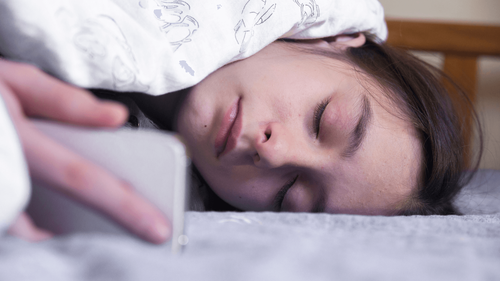While we expect our teens to be sleepy and grumpy, is there more to it? Reports suggest the majority of our teens are sleep deprived - how can we help them get a good night’s sleep?
Sleepy teenagers are a common stereotype. Most parents have to drag their grumpy teenagers out of bed in the morning at some point. Isn’t it all part of growing up?
 Not necessarily. Some research suggests that up to 70% of teenagers are sleep deprived. Some of this is partly biological; a teenage biological clock shifts tiredness back by a couple of hours, resulting in teens going to sleep later. However, this shift doesn’t mean they need less sleep. In fact, it’s the opposite - your teen needs nine hours sleep on average.
Not necessarily. Some research suggests that up to 70% of teenagers are sleep deprived. Some of this is partly biological; a teenage biological clock shifts tiredness back by a couple of hours, resulting in teens going to sleep later. However, this shift doesn’t mean they need less sleep. In fact, it’s the opposite - your teen needs nine hours sleep on average.
There is also research to suggest that troubled sleep might be linked to anxiety and depression. In some instances, teens are being misdiagnosed as having mood disorders when the real problem is erratic sleep patterns.
It can be difficult to convince teens that they need to go to sleep - it’s not appealing to them when there is so much going on in their lives. So how can you help your sleep-deprived teen?
Look for signs If you think sleep deprivation could be a problem for your teen, look for some of these signs:
If you recognise any of the above signs in your teen, think about how you can help them to achieve a better night’s sleep. | |
Environment A comfortable place to rest is something we all need for a good sleep. Work with your teen to decorate their room in their style. Ask them what kind of bed covers they would like or what colour paint on the walls, what colour curtains etc. | |
Routine As teens get older, they have full social lives and a heavy workload, all contributing to a busy mind. Organisation and routine become essential for managing this new way of life. Try incorporating some of the following into their weekly routine.
| |
Screens Increasingly, teens are looking at screens until late into the night. It’s important to try and restrict screen time, especially before bedtime. It contributes to a busy mind, and too much blue light disrupts the body's production of melatonin - the brain chemical responsible for sleep. As an alternative to screens, try some meditation techniques or other tools to quiet your teens buzzing brain before sleep. You can find some useful tips on this link from the organisation Headspace. |
It might be a long process to change your teens sleeping habits, but it’s worth it; a good regular sleep will help improve their overall health, wellbeing and concentration.
Sources:
- Headspace
- Sleep Health Foundation: SleepShack
- SBS: The dangers of sleep deprivation in teenagers – and the solutions
- VIC.gov: Teenagers and Sleep
Parenting HUB | For more tips and practical advice on building positive relationships with your child.
The resources in our Parenting HUB are put together by our family specialists who work with families across Sydney every day. If you would like to know more about this topic, please fill in our 'Contact Us' form and we'll get in touch. You can also call our professional Parent Line NSW counsellors on 1300 1300 52 for individual advice.
Disclaimer: This article does not give professional advice. The contents constitute general information of a summary nature of interest and relevance at the time of publication. You should not rely on the contents as professional advice but should seek, formal advice in particular matters relevant to your particular situation
If you or anyone you know would like help please call our team on 13 18 19 or contact us online.